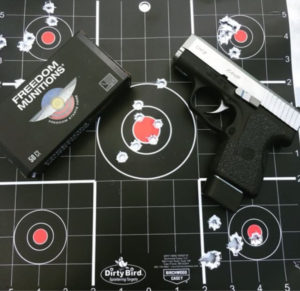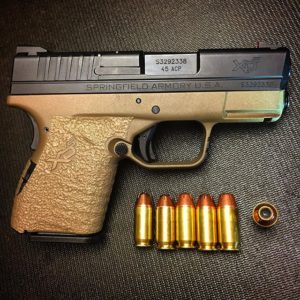By Jay Chambers
We live in a time where almost anyone can own a gun – provided they are in the right state of mind and do not have any prior criminal record. If someone living in a dangerous neighborhood would feel safer with a gun in their safe or their bag, there is no reason why they should not be granted concealed carry permit.
Still, when you are buying a gun for self-defense – and not just as a hobby – the chances are that you will not know exactly what type of ammo to choose for your gun. Granted, while every type of ammo can lead to heavy damage once it hits the target, they all leave a different kind of damage.
If you are looking to purchase a gun for self-defense, then this article will walk you through the basics of self-defense ammunition.
Practice vs. Target vs. Self-Defense Ammo
To understand what self-defense ammo is, you need to understand the other types of ammo as well.
- Practice and Target Ammunition
First things first, practice ammunition (or “dummy rounds”) is the type of ammo that you use during gun practice. The anatomy of such a bullet is simple: obviously, it has to go with a bang – but practically, all it needs to do is to make a few holes on a target and maybe make some noise when it hits.
This is why manufacturers don’t use anything but the basic, inexpensive stuff when creating the bullet. This ammo will use cheap powder, bras, alternative metal cases – in a manner that is as simplistic as possible.
Since their only purpose is to make a hole in a paper, they won’t be doing anything fancy upon hitting a live target. The result? If you try to shoot an attacker with this type of bullet, they may just pass through and not cause any fight-stopping damage. Even worse, if that bullet passes through, you might just risk shooting someone that you don’t want to.
Target ammunition is based on the same principle as practice ammunition – only that the materials used are not that cheap. Their purpose is to hit a target and cause fighting-stopping damage. However, this kind of ammo can also pass through the target – and unless the gun owner is a very good shooter, the chances are that you might miss the vital organs – or any other point that you are aiming at.
- Self-Defense Ammunition
Unlike target ammo, the one designed for self-defense will get bigger once it hits the target – and therefore causing more damage that will stop your attacker. This type of ammo is designed to work every time it hits the target – and it should hold up for years even in a humid environment, without losing its efficiency. This type of ammo also has hollow points, which will further allow the bullet to expand once it hits the target and will create more damage.
So as to retain these qualities, manufacturers of self-defense ammo need to pay special attention to the components of such a cartridge:
- Cartridge Case: In order for the self-defense ammo to be effective, most manufacturers use nickel-plated casing so that the ammo can resist in humid conditions. This cartridge also gives the bullet more visibility in the dark.
- Powder: When creating self-defense ammo, the manufacturer needs to make sure that the bullet does not only go “bang;” it also needs to have velocity in every shot. This is why the powder receives chemical treatment in order to provide low-flash burn and improve visibility for the shooter.
- Projectile: The rate at which the bullet expands is also of great importance. If it over-expands, the chances are that it will not do much damage to the target. If it under-expands, it can go right through – therefore putting your life in danger when the bullet does not stop your attacker.
To put it plainly, self-defense ammo can cause harm to your target, even if you are not the best of shooters. They are appropriate for close-range shooting, proving visibility to the gun owner and causing enough damage so that they can escape.
Self-defense ammo is more expensive than the other types – so anyone who would pick this type of ammo would need to make a small investment. However, it is a small price to pay when you are in a situation where your life is on the line.
Choosing Self-Defense Ammo
So, aside from the basics mentioned above, how do you choose self-defense ammunition? The easiest, surefire way (pun intended) would be to learn about what your local law-enforcement institutions use. Generally, they also use self-defense ammo – mostly for its ability to bring down a target.
Furthermore, it is safe to say that before committing themselves to such a great responsibility, they have done a lot of research for it. Plus, they have been trained in this respect – so you can say that they know what they are doing.
Last but not least, you should steer yourself towards ammo brands that have a strong reputation – such as Remington, Federal, Winchester, or Sig Sauer. This way, you will have fewer risks of damaging your gun or injuring yourself by mistake.
Who Should Buy Self-Defense Ammo?
Needless to say, those who buy self-defense ammunition are those who have reason to fear for their safety. This type of ammo is good for people who are not that good shooters since it can expand and penetrate a target more efficiently.
Self-defense ammo is a good option for those who do not use their gun on a regular basis – since it is more resistant to humid temperatures. However, you will have to shoot the gun every few months to ensure that the gun doesn’t get “rusty” with the bullets inside.
Final Thoughts
Self-defense ammo is a good option for those that do not have superior target abilities. However, while they may be a good option for “newbies,” you may still want to invest in some practice ammo as well and shoot some rounds. If you are ever forced to use your gun for self-defense, you might want to get used to the feeling first.



I know this is strictly about ammunition choice but I don’t find it wise to leave it at “it’s better for inexperienced shooters”. There should be some stress of the point that if you are going to carry a firearm you should put in the time and effort to be proficient with that weapon so as not to pose a threat to the people you are hoping to protect. Just my opinion.
Err Jay? I won’t nit pick as it would take too long but “dummy rounds” are most certainly NOT practice ammo. Read the description in the link you provide. “Inert” rounds do NOT go “bang”; they just sit there…INERT.
I would think Hornaday would make the defense ammo list for sure?
Since when does a gun expand? In the defense round section sentence says,”This type of ammo also has hollow points, which will further allow the gun to expand once it hits the target and will create more damage.”. Oops!
Good catch! The article has been updated.
Adam
I think it would be a good idea to let people know that it’s also very important to practice enough with the self defense ammo they choose to be sure their firearm will cycle it and not cause any jams, hang ups, etc… if they ever have to pull it out and defend themselves with multiple shots they want to be sure the rounds will feed, chamber and fire, As we all know, some firearms are finicky with some ammo. Just a thought. Thanks,